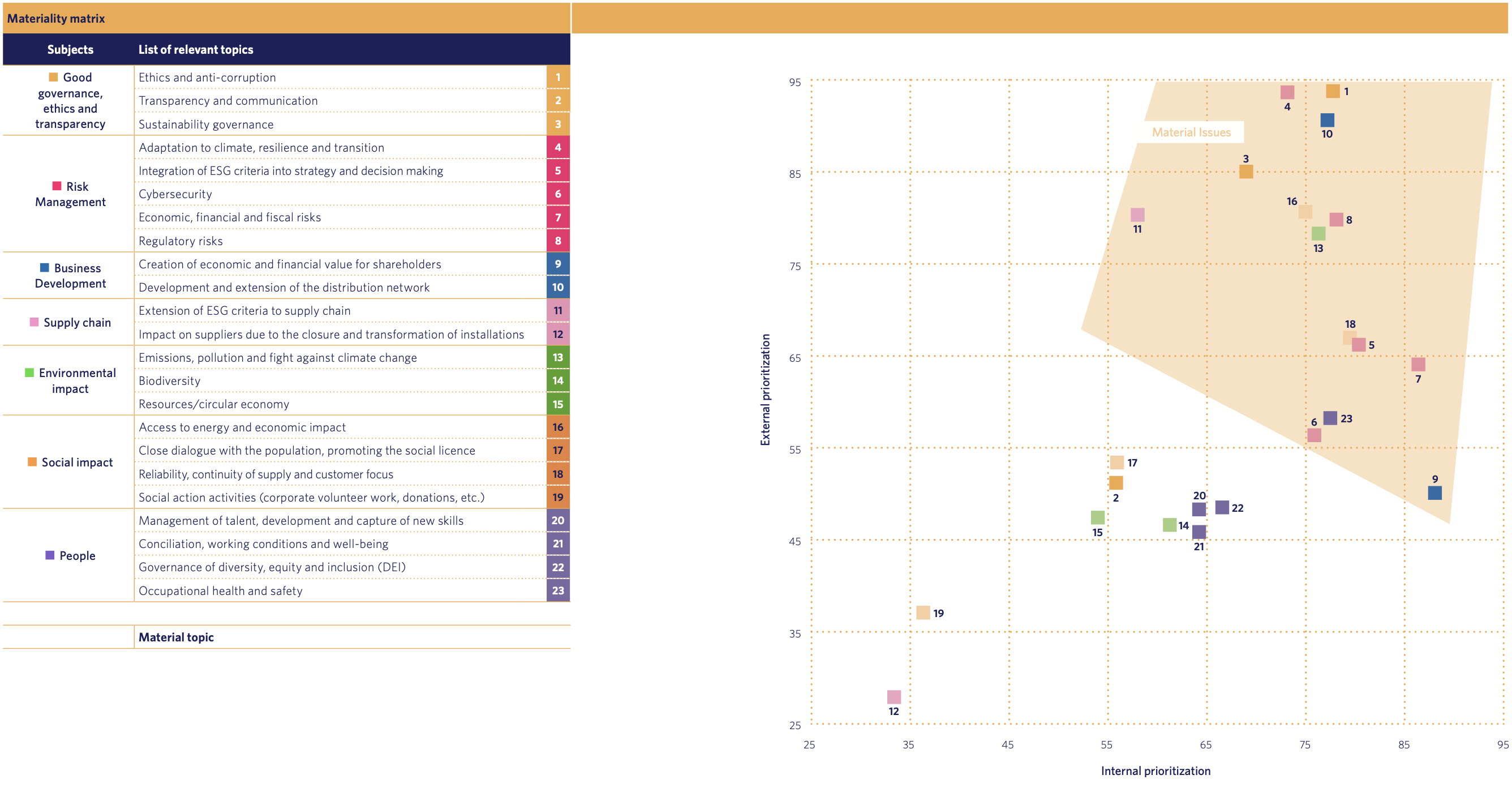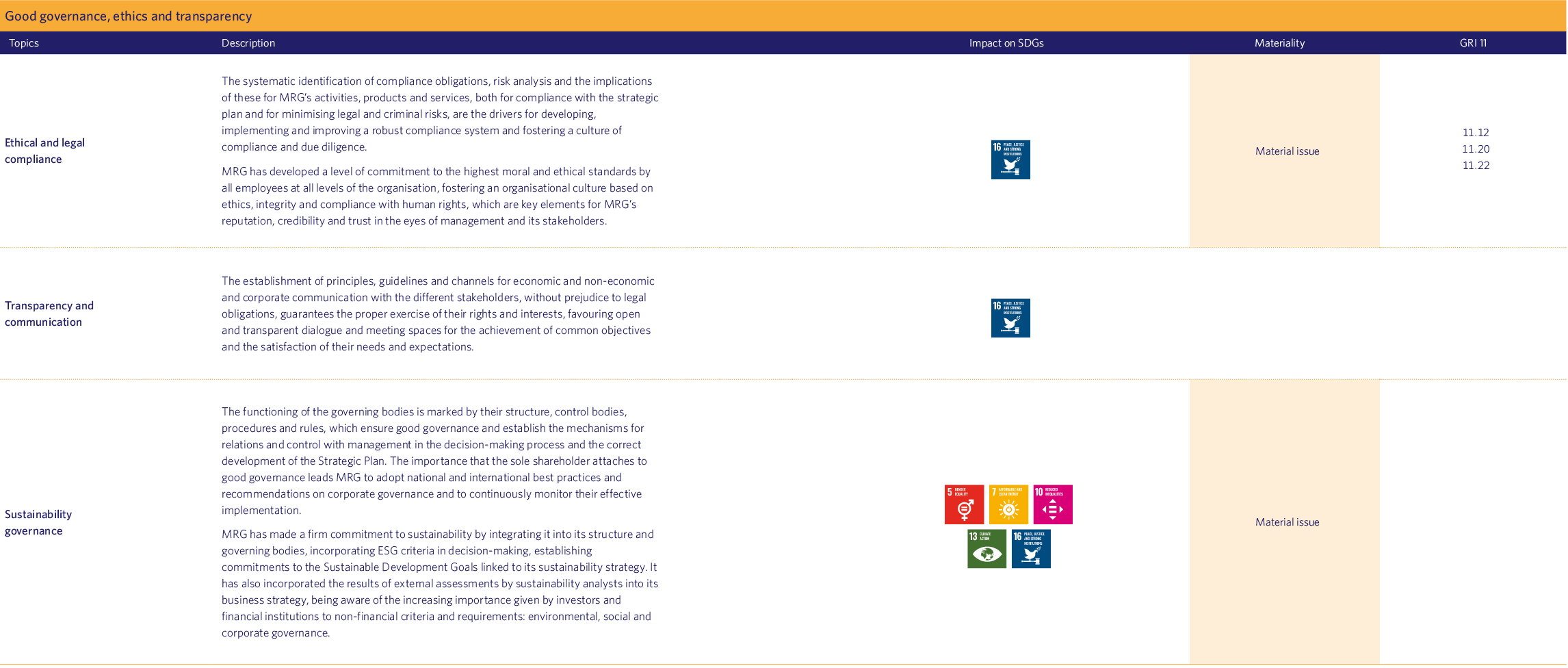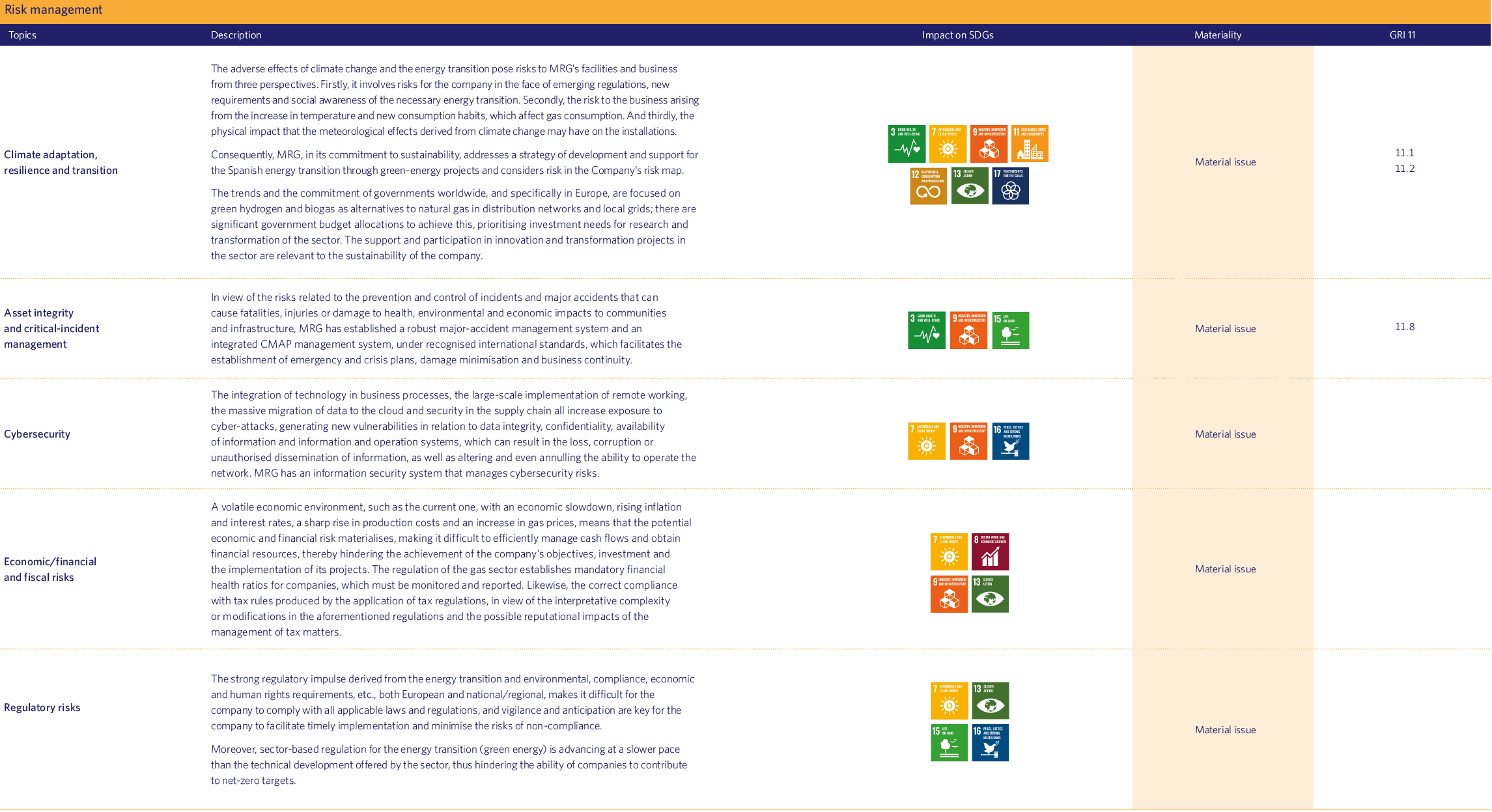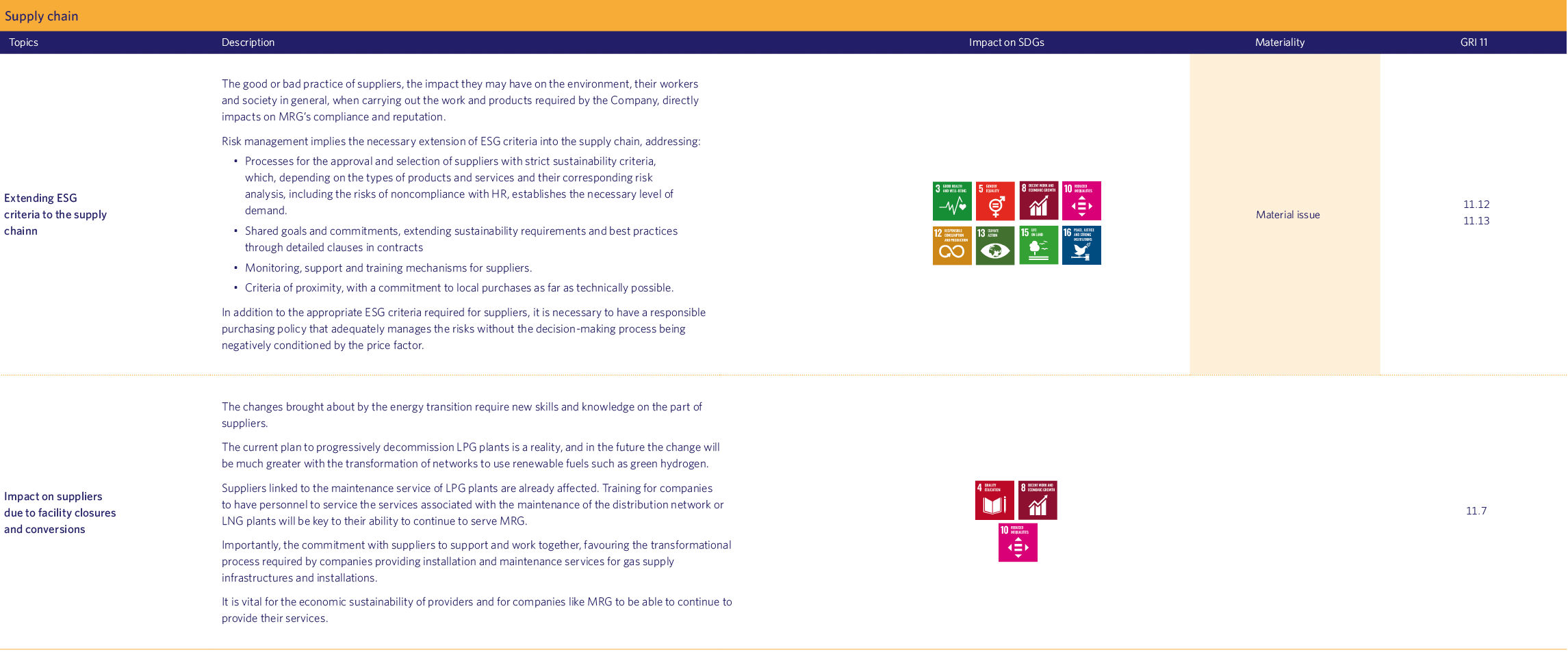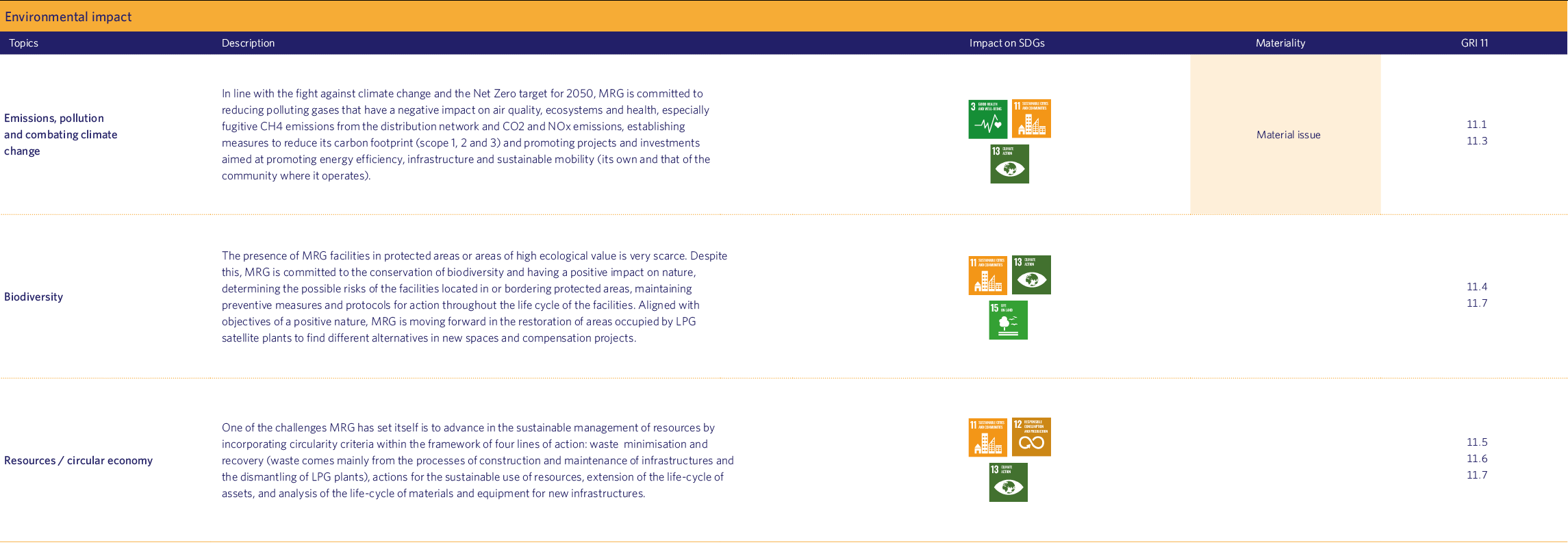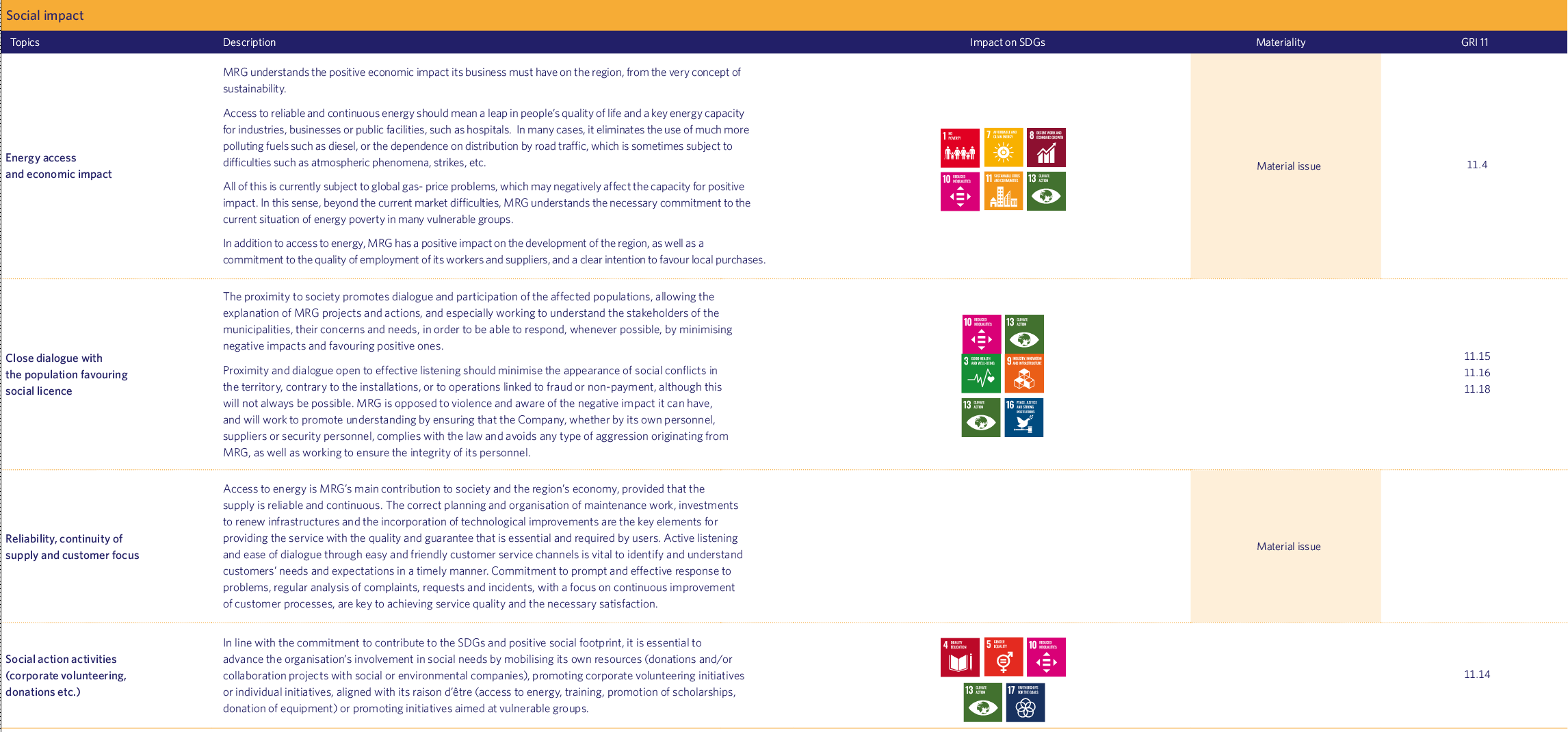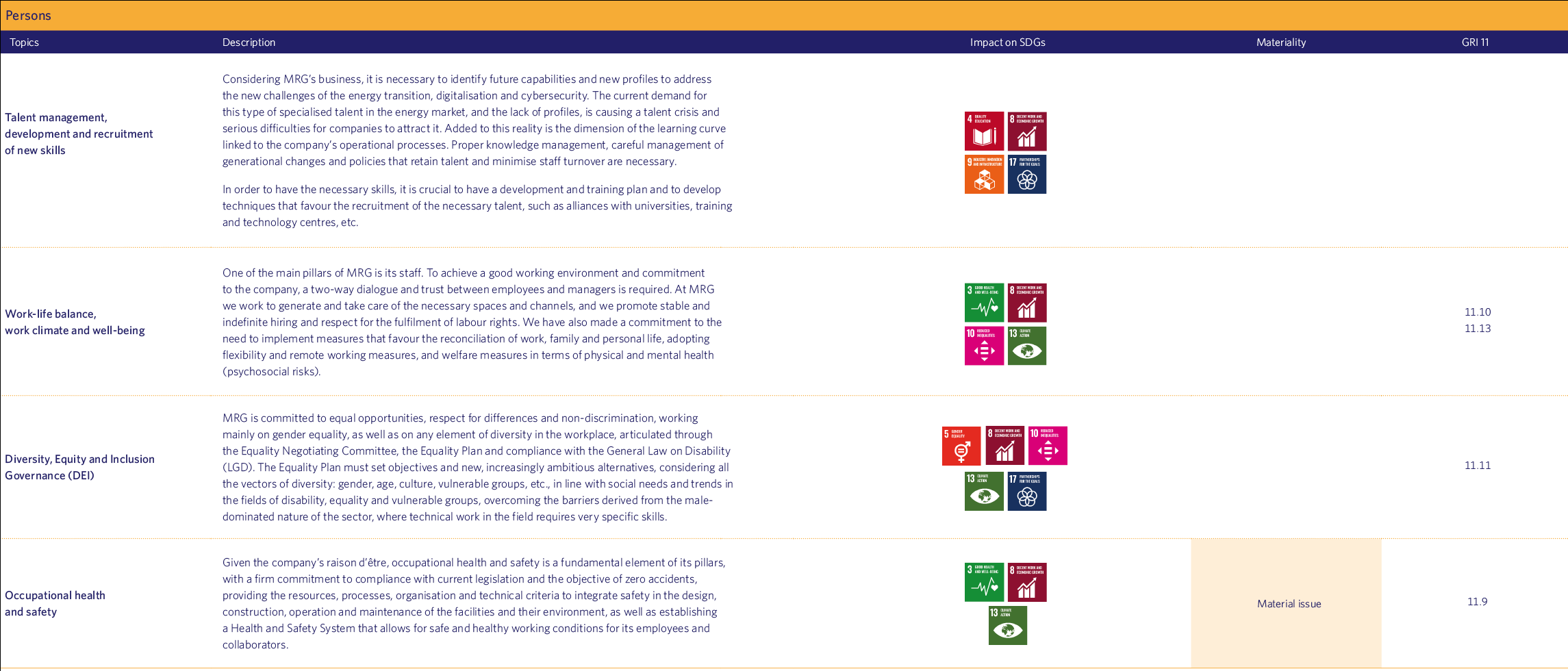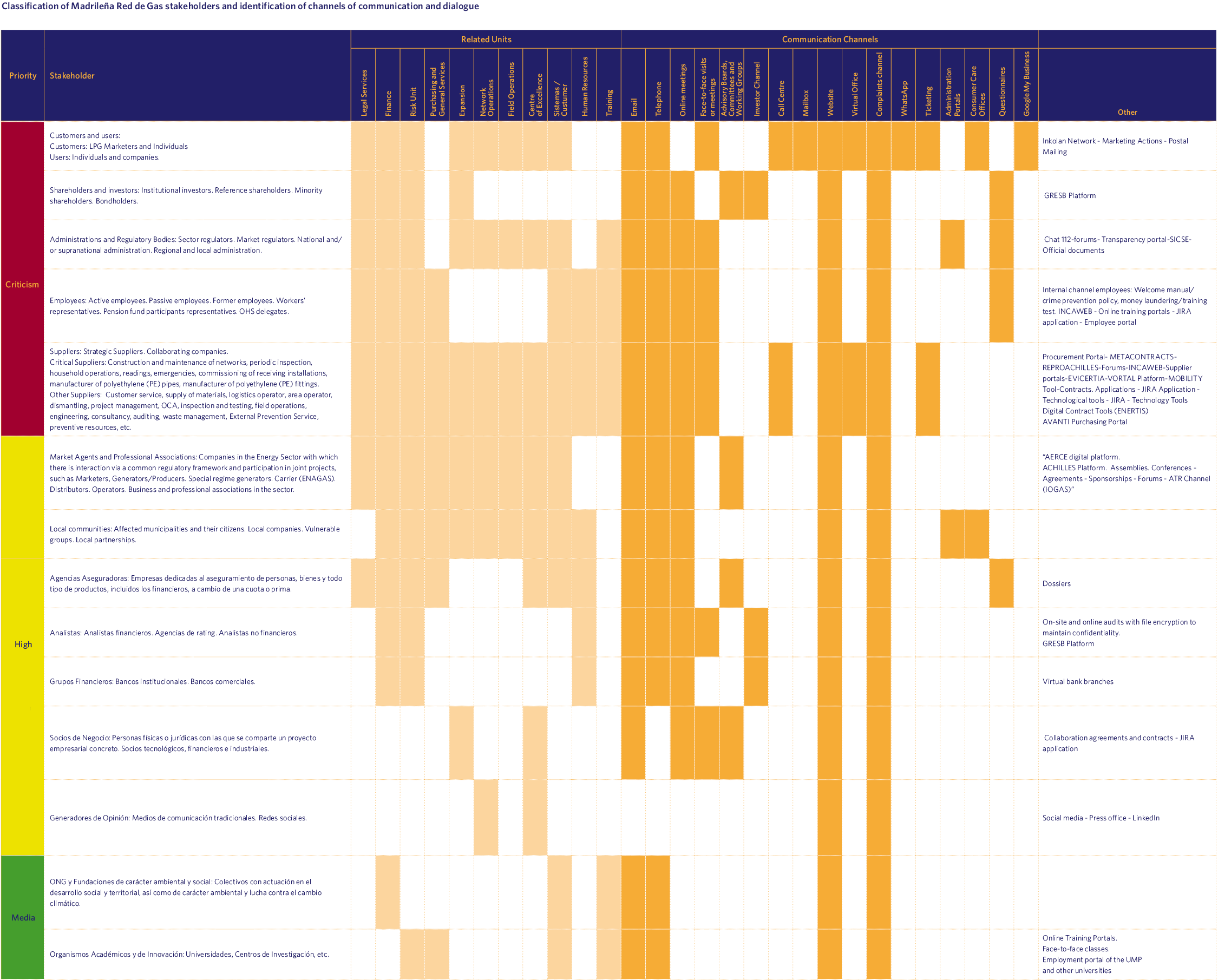4.1 Main milestones 2023
Every year, Madrileña Red de Gas makes progress in our commitment to sustainable development. An important cause for celebration in 2023 was the successful assessment against the GRESB Infrastructure Sustainability Index. Indeed, for the first time, we obtained a maximum score of 100 points. It gives us great pleasure to see how our efforts have been valued so positively; it seemed difficult to improve the international benchmarking scores, given the excellent results of the last few years, but the work and commitment of the Company was once again understood and valued in GRESB’s annual evaluation.
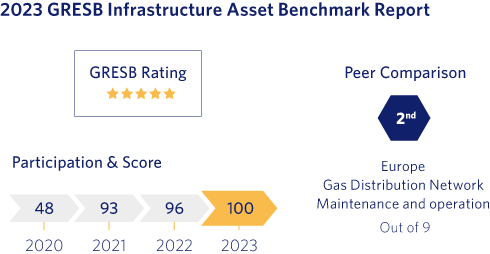
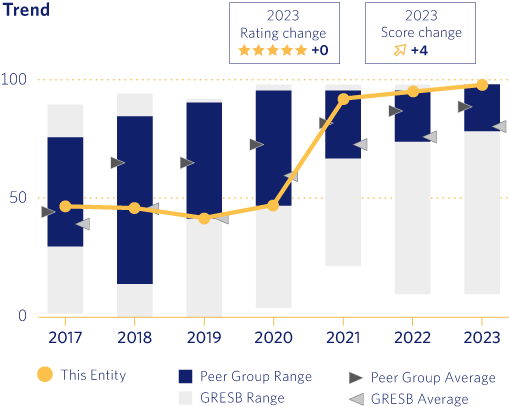
Since the first assessments against GRESB, Madrileña Red de Gas has seen the criteria of the Index as an opportunity to make progress in the continuous improvement of sustainability issues. This effort to improve has made it possible to achieve the maximum “five star” rating for the third consecutive year. Indeed, we remain in second place at a European level in this international benchmarking and are leaders in Spain.
Year after year we have matured as an organisation in terms of integrating sustainability into our business strategy. The entire organisation has worked to understand and incorporate sustainability concepts into business processes and plans, and the elaboration and deployment of the Sustainability Master Plan is clear evidence of this effort.
During 2022, we undertook a major materiality review incorporating the dual perspective, thereby adding the risks and opportunities that sustainability issues could pose to the business to the analysis of our impacts on the environment and stakeholders. As a result of the analysis, we began to draw up a Sustainability Master Plan. In 2023, thanks to new publications from EFRAG (European Financial Reporting Advisory Group) on the methodology of double materiality, and the drafts to which we had access on the criteria of the rules of the new CSRD (EU Directive 2022/2464 on Sustainability Reporting), we adjusted our methodology for assessing and prioritising material issues, reinforcing the assessment of financial relevance with the opinion of stakeholders in the financial environment (Banking, Shareholders and Insurance Companies) and defining how to set the cut-off thresholds in the prioritisation stage more clearly. In order to systematise the process, we drew up and approved a Management System procedure that includes the methodology for determining materiality in Madrileña Red de Gas.
In this regard, in 2023 we carried out a small review of materiality, in line with the procedure, and we took the opportunity to simplify the list of relevant topics on which to apply the assessment and prioritisation methodology. This simplification had become increasingly necessary when addressing our Sustainability Master Plan. In point 3.2. Material Issues, we detail the changes made and the results of the review.
As a result of our 2022 materiality analysis and its application to the 2023 review, a key milestone has been the definition of our 2023–2026 Sustainability Master Plan. The deployment thereof will be completed by 2024, although 44 actions have already been launched in 2023, of which 86% were completed during the year and 14% are in progress. More information on our Master Plan is provided in section 3.3. of this chapter.
Other notable milestones this year in addressing our sustainability strategy have included:
- The updating of our Corporate Responsibility Policy by defining a Sustainability Policy (accessible on our website), which aims to integrate all the policies and management frameworks in the field of sustainable development by which we are governed, pointing out the role of the governing bodies and reinforcing our commitment to our stakeholders and to the seven principles of social responsibility, internationally recognised in the ISO 26000 guide to Social Responsibility.
- Although the Audit and Risk Committee was previously the Governance Body that had assumed responsibility for steering the sustainability strategy and acted as a transmitter to the Board of Directors, in 2023 we organised these functions and formally defined our management systems.
- We continue to work towards integrating the requirements of the ISO 26000 and IQNet SR10 standards into our management system. In this regard, we would like to highlight the update of our Integrated Management System Manual, as well as the start of the review of the strategic risk analysis process.
- Finally, although already mentioned in chapter 2, this year we have updated our Code of Ethics, incorporating the response to new legal requirements and reinforcing our commitment to Human Rights throughout the value chain.
4.2 Materiality matrix review
As mentioned in the previous section, during 2023 we carried out a small revision of the material topics, adapting the prioritisation to the methodological changes included in the procedure, and grouping relevant topics for which a level of disaggregation that added difficulties both in the prioritisation process and when it came to managing them had been identified in 2022.
The following diagram shows the groupings we made on the list of relevant topics, indicating the 2022 topics that have been grouped under a single relevant topic in 2023.
The identification of potential impacts, risks and opportunities that had been made for each topic remains in each grouping, although duplications are eliminated and their understanding and assessment is simplified.
In some areas the reason for simplification is obvious, but in others we would like to clarify the reasons for the decision.
- Innovation in green hydrogen and biogas technologies is the cornerstone on which we base the risks and opportunities of the energy transition in our company as a distributor of natural gas.
- Access to energy, which we see as our best chance of making a positive impact on society, requires a clear customer focus.
- Finally, we note the elimination of process digitalisation as a relevant topic. This is not currently a challenge given the level of maturity of digitalisation in the company, beyond the cybersecurity risks associated with digitalisation, a risk that we do consider and have included in the list of relevant issues.
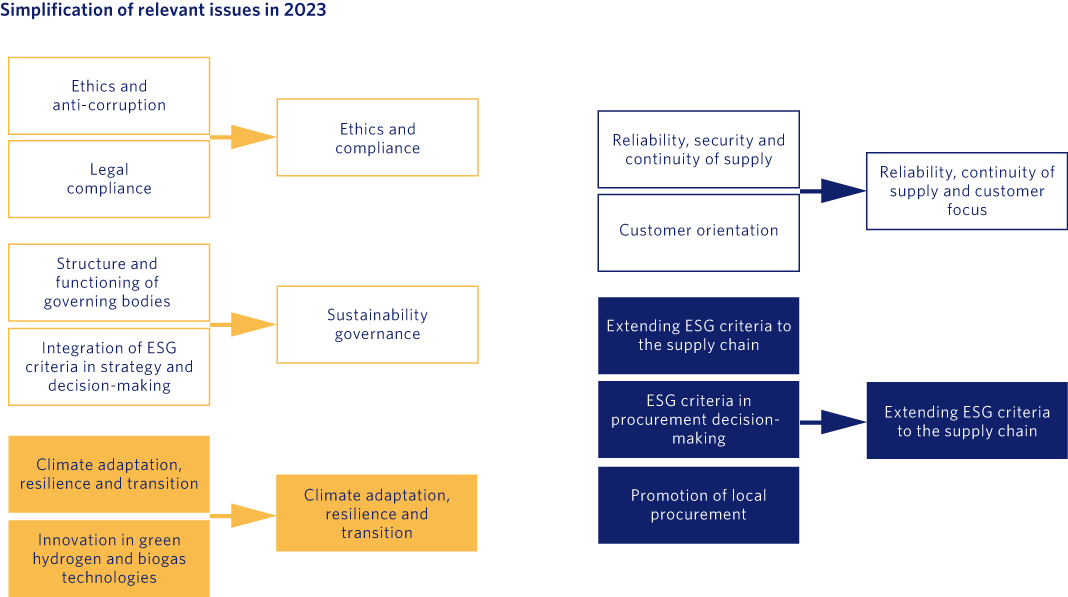
With respect to the topics indicated by the thematic proposal of the Sector standard GRI 11: Oil and Gas Sector, 2021, most of these have been included in the structured list of relevant issues, which can be found in the detailed table “Description of relevant issues and topics” in this chapter.
As in 2022, three issues proposed by the Sector GRI are still not considered relevant for Madrileña Red de Gas:
- GRI 11.17: Rights of indigenous peoples. Given that Madrileña Red de Gas operates only in the Autonomous Community of Madrid, where even its suppliers are mainly local, we consider that there can be no material impact.
- GRI 11.19: Unfair competition. Madrileña Red de Gas is a regulated business, therefore unfair competition would be directly linked to corruption.
- GRI 11.21: Payments to governments. Considering the regulations that apply to Madrileña Red de Gas in Spain, we would again be talking strictly about corruption.
- GRI 11.22: Public Policy. Spanish legislation does not allow direct promotion of public policies by private companies. As in the two previous requirements, this would be a case of corruption.
We did not conduct any new interviews in 2023 as the previous process was very recent and the review we were conducting was very small.
As regards the methodological change when considering the opinion of stakeholders from the financial environment for the evaluation of the issues from the perspective of Madrileña Red de Gas, we separated the information available from the 2022 surveys on the basis of this criterion.
With regard to the grouping of certain relevant issues, as indicated above, we have assessed the impact, risks and opportunities, considering the new list, and applying the criteria set out in the methodology. To capture stakeholder opinion, given that we have not conducted any new surveys this year, we have considered the most conservative values of the grouped elements, such that if an issue in 2023 groups two issues from 2022, the importance given by the stakeholders will be considered the higher importance among the issues from 2022, and in terms of performance the more unfavourable of the two.
We plan to conduct a new in-depth materiality analysis in 2025, again engaging with stakeholders through a process of in-depth interviews and surveys, beyond the usual contact we have through our processes and services.
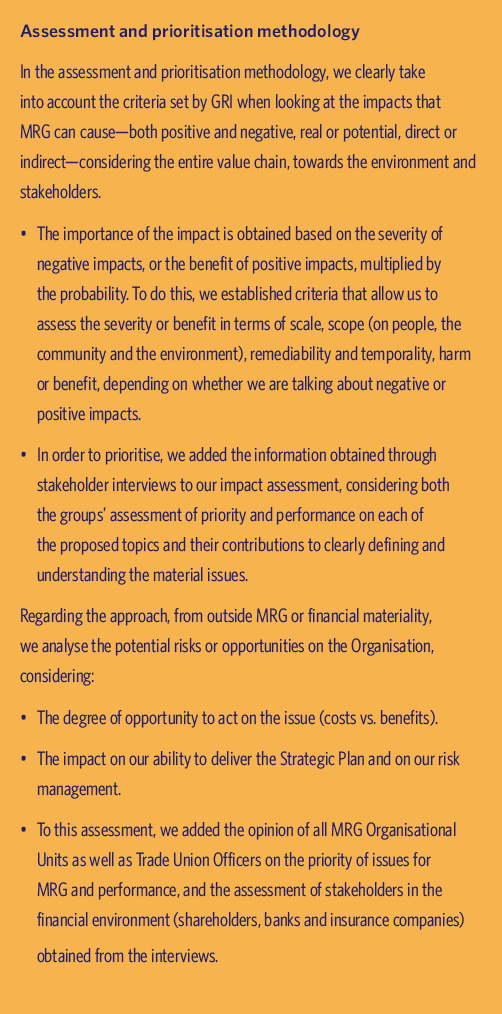
Another change in our methodology has been the establishment of thresholds to determine the relative and overall priority after the assessment, considering the quartile method, and the second quartile in particular.
Below we present the result of the materiality update process carried out through our materiality matrix.
It is important to note that, after the evaluation and prioritisation process, according to our methodology, not all the issues proposed by the Sector standard GRI 11: Oil and Gas Sector 2021 and initially identified as relevant have turned out to be material for Madrileña Red de Gas. Specifically, the Sector issues that have been included in the material issues and topics of Madrileña Red de Gas are as follows:
- 11.1 GHG emissions
- 11.2 Climate adaptation, resilience and transition
- 11.3 Air emissions
- 11.8 Asset Integrity and Critical-Incident Management
- 11.9 Health and safety at work
- 11.12 Forced labour and modern slavery
- 11.13 Freedom of association and collective bargaining
- 11.14 Economic impacts
- 11.20 Anti-corruption
4.3 Sustainability Master Plan 2023-2026
Based on the outcome of the materiality analysis and the assessment of opportunities for improvement that we gathered both from internal meetings and stakeholder interviews conducted during the analysis, together with our identification of priority SDGs for our ability to contribute, we have developed an ambitious Sustainability Master Plan.
This Plan has been structured into strategic axes and lines of action, which in turn are deployed in a set of actions and goals for the four years of work. We have established 8 strategic axes, which correspond to the 7 material issues identified and a transversal axis of action common to all of them.
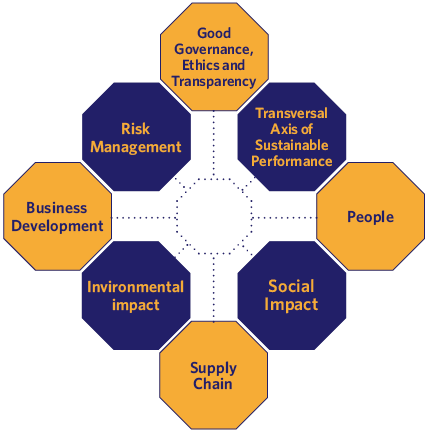
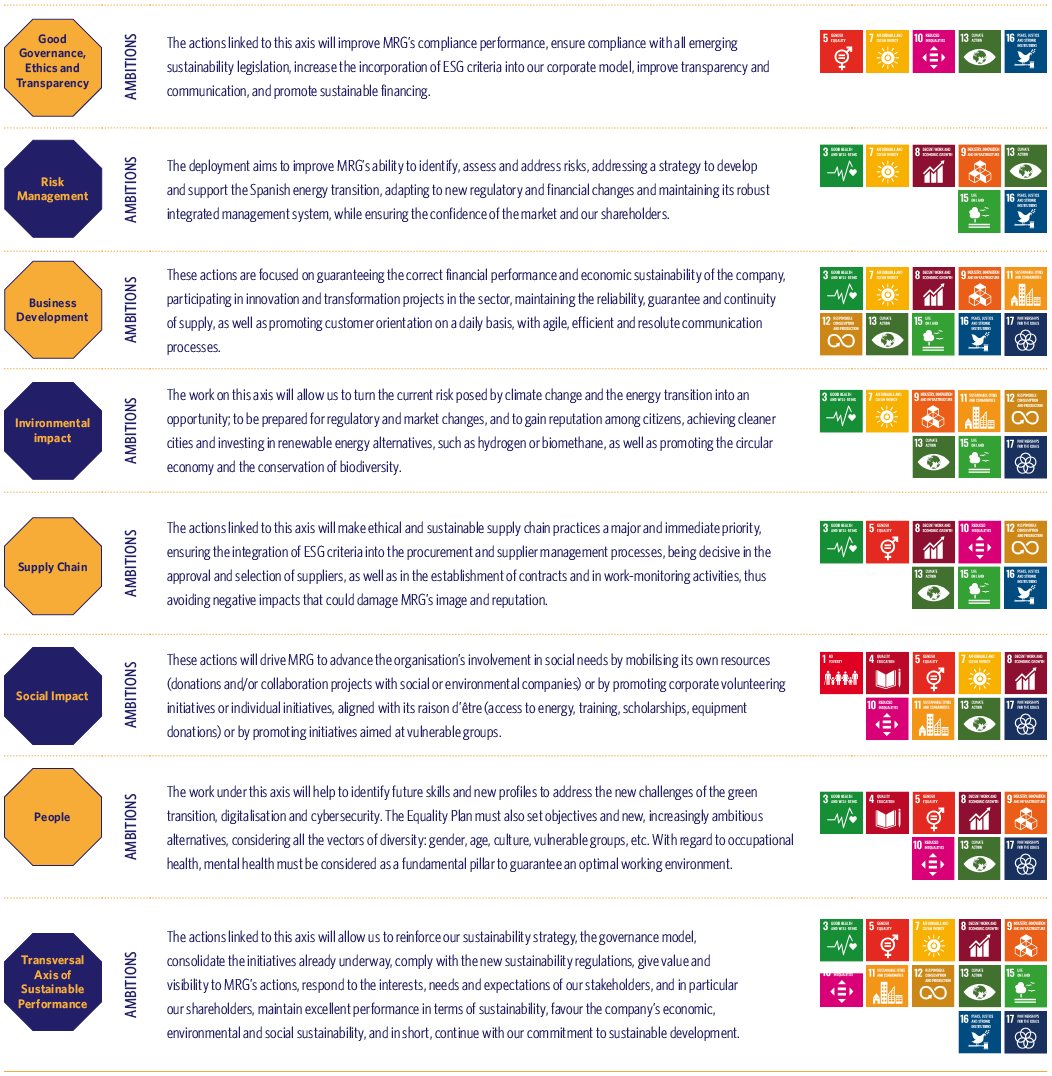
The following are the lines of action around which each axis is deployed:
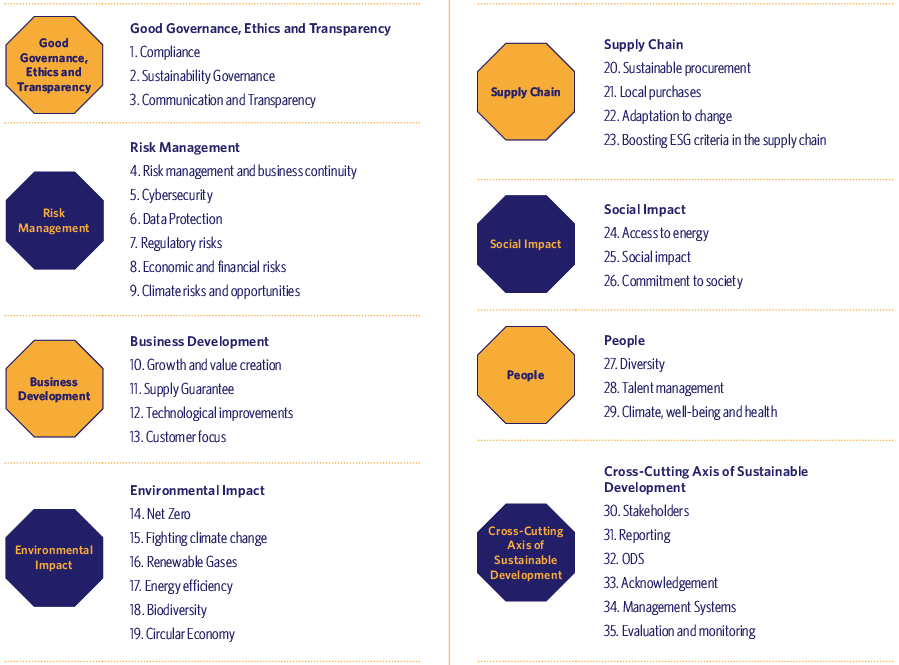
As indicated, the lines are deployed in 43 actions and these, in turn, in 198 goals. For all of them, the departments responsible for their implementation and the material or relevant issue to which they mainly contribute are identified.
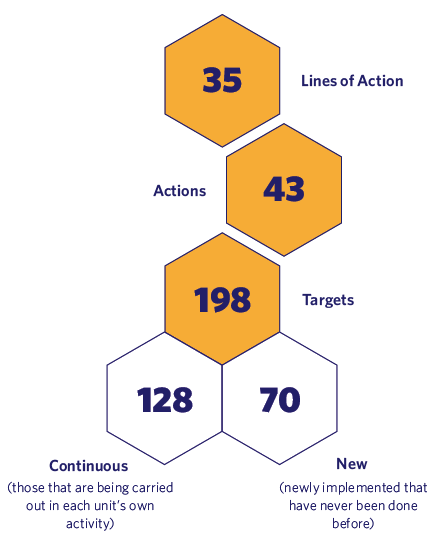
The prioritisation of material issues, the current level of performance, the existence or not of legal or regulatory requirements to be covered, and the need for resources to carry out the activities have been the fundamental elements for prioritising and planning the work in the four years of the Plan’s scope. In all cases we have sought to balance the burdens on the different departments responsible for implementing the actions over the period 2023–2026.
The communication and deployment of the Plan to the different Units of the Organisation will take place in the first quarter of 2024.
The Risk-Management Unit is responsible for implementation of the Plan and its monitoring. An evaluation of activities and goals is carried out at least half-yearly, based on the information provided by the different Units of the Organisation. These evaluations should make it possible to identify and correct any difficulties and to incorporate new proposals, if necessary. The GIS Committee is responsible for validating plans and outcomes.
The Audit and Risk Committee, as the governing body responsible for integrating sustainability into the Company’s strategy, will support implementation of the Plan and its monitoring, issuing the necessary recommendations and transmitting the information to the Board of Directors for approval and inclusion in decision-making.
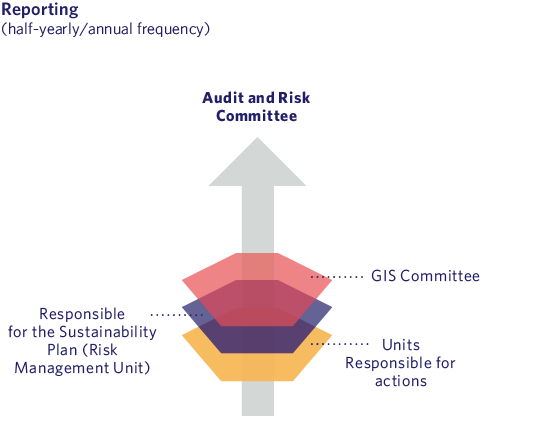
4.4 Our stakeholder model
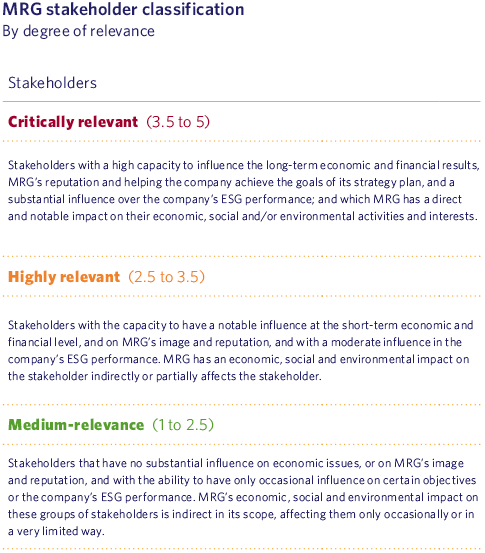
Madrileña Red de Gas has a Stakeholder Model that is governed by the following principles:
- Value creation: we seek to bring value to stakeholders by developing a sustainable business model.
- Identification of needs and expectations, incorporating the most relevant ones into our strategy.
- Communicating our sustainability strategy, our social responsibility behaviours and our commitments to stakeholders.
- Channels and dialogue: Madrileña Red de Gas provides its stakeholders with the necessary channels to manage requests for information, opinions, complaints and claims, and establishes dialogue mechanisms to respond to their requirements and expectations.
- Continuous improvement: As part of our social responsibility management system, we establish regular mechanisms for the evaluation and review of our stakeholder management model.
As part of the model, in 2021 we reviewed our stakeholder identification and relationship framework in depth. To this end, we carried out an analysis of the processes and a process of internal dialogue with the different units of the organisation. This analysis allowed us to gain in-depth knowledge about:
- The relationship between the groups and Madrileña Red de Gas: the reason for the relationship (the why)
- Our ability to have an impact on the groups (positive and negative) and vice versa, their capacity to influence decisions and results in Madrileña Red de Gas
- Dialogue channels
- An initial identification of expectations on the part of the groups and the mechanisms with which we at Madrileña Red de Gas respond to them
Based on the influence and impact capacities we evaluate the criticality of the groups through the methodology systematised in the internal procedure of the management system “Stakeholder management”.
In 2023 we revised our supplier stakeholder definition, adding a classification and associated activities. This change allows us to segment critical suppliers from non-critical suppliers, a segmentation that results in clear differences in the relationship framework, as described in Chapter 7 “Responsible Supply Chain”.
The detection of needs and expectations is carried out continuously through communication and dialogue via the channels established between the different organisational units of Madrileña Red de Gas and the stakeholders with which they have a relationship. Beyond the day-to-day, the Risk Unit periodically carries out a more in-depth analysis, with internal interviews to analyse the relationship with the groups and review the model. The periodicity is set at three years, and the next study will be conducted in 2025, together with the more in-depth review of materiality. We will also take advantage of this process to conduct in-depth interviews with stakeholders and assess their concerns in their relationship with the Company, expectations and needs, as well as their assessment of performance.
Beyond day-to-day business and materiality studies, especially with critical stakeholders, we conduct regular satisfaction surveys. In 2023, we conducted a new work climate survey of our employees, through an independent company. The survey has increased the percentage of participation (80%, an increase of 5%) and we have obtained positive satisfaction results, with 83% of participants being satisfied with the aspects included in the survey, as set out in the chapter dedicated to the people of the organisation.
With regard to the stakeholder group Customers, given our raison d’être they remain the target of our improvement projects. Among other improvement activities, we continue to focus on improving the virtual office by facilitating easy access to our customers’ procedures and adding agility in the provision of the necessary documentation for customers and installers, thereby favouring the reduction of response times in services. Along the same lines, while maintaining our focus on improving customer service during commissioning, Madrileña Red de Gas has corrected small defects in old installations that would otherwise have forced the customer to make an unexpected financial outlay, at no cost to them. This also allows us as a distributor to reduce the cost of intervention by reducing the number of visits required for commissioning. In chapter 9 Social impact, we provide further information about our efforts in 2023 to address our customers’ needs and improve their satisfaction.
Finally, in this section we would also like to highlight the growing importance of the relationship with the group “Business Partners”, as well as with “Market Agents and Industry Associations”. The energy transition is a major challenge for us as a distributor, and we have to face it by adapting our networks and our services for the distribution of renewable gases. This research and innovation effort is a journey we cannot undertake alone. For years, we have been working with companies and associations in the energy sector and other sectors, such as real estate and equipment manufacturers, on projects aimed at making this transition a reality. Projects that, little by little, grow and consolidate, and move on to phases in which collaborative work is fundamental. In the chapter on Risk Management, we set out in detail the importance and good results we are achieving in these joint projects.
As part of the alliances established to tackle the energy-transition process, we are also strengthening our relationship with “Academic and innovation organisations”. Specifically, last November we signed a collaboration agreement with the Francisco de Vitoria University to jointly develop, implement, maintain and operate a renewable hydrogen storage and supply infrastructure in one or more buildings at the University. This interesting work is discussed in more detail in chapter 5. Another notable example is the collaboration with the Instituto de Ingeniería del Conocimiento (IIC), an expert in data analysis and Big Data technology, with which we collaborate with the aim of predicting the annual distribution of gas and better managing the service.

